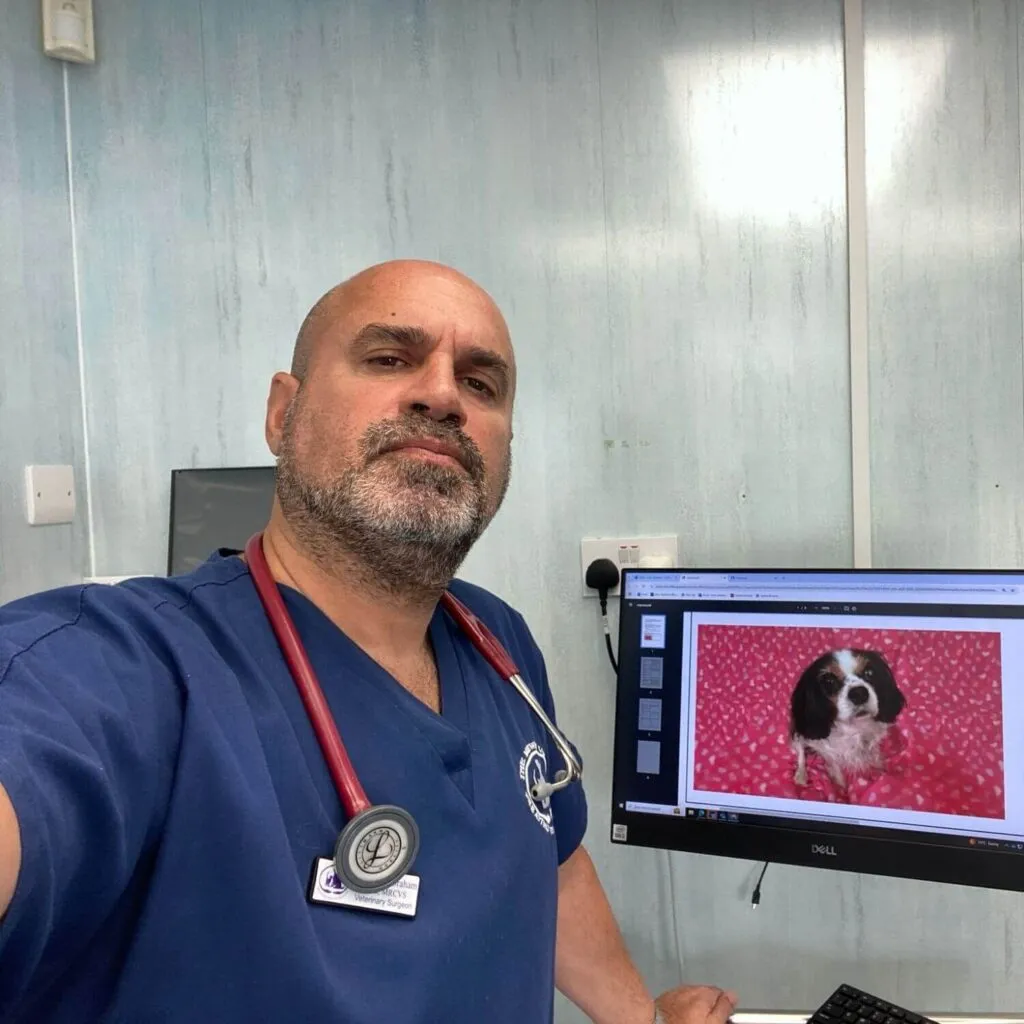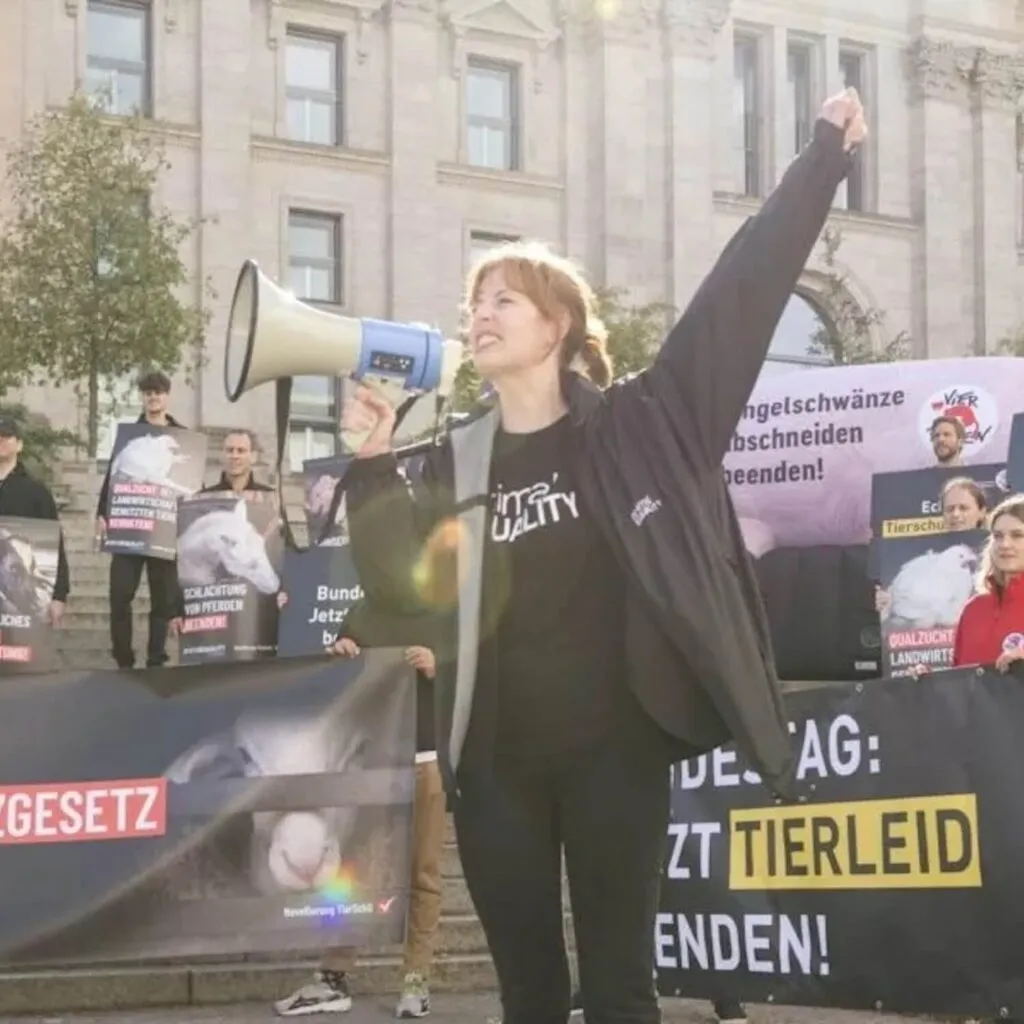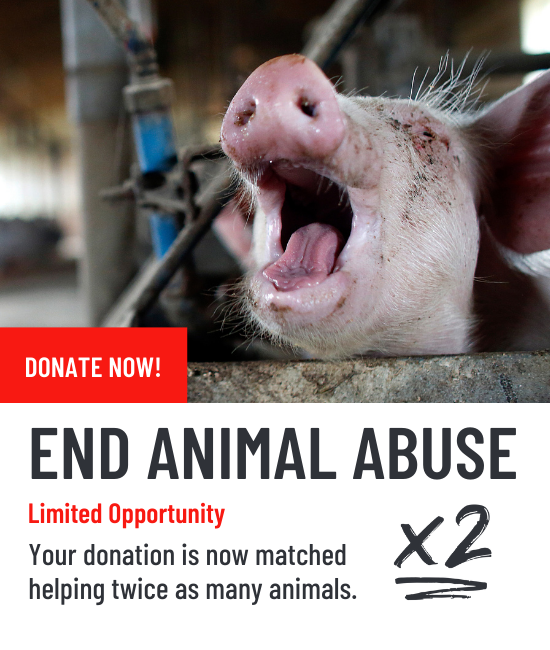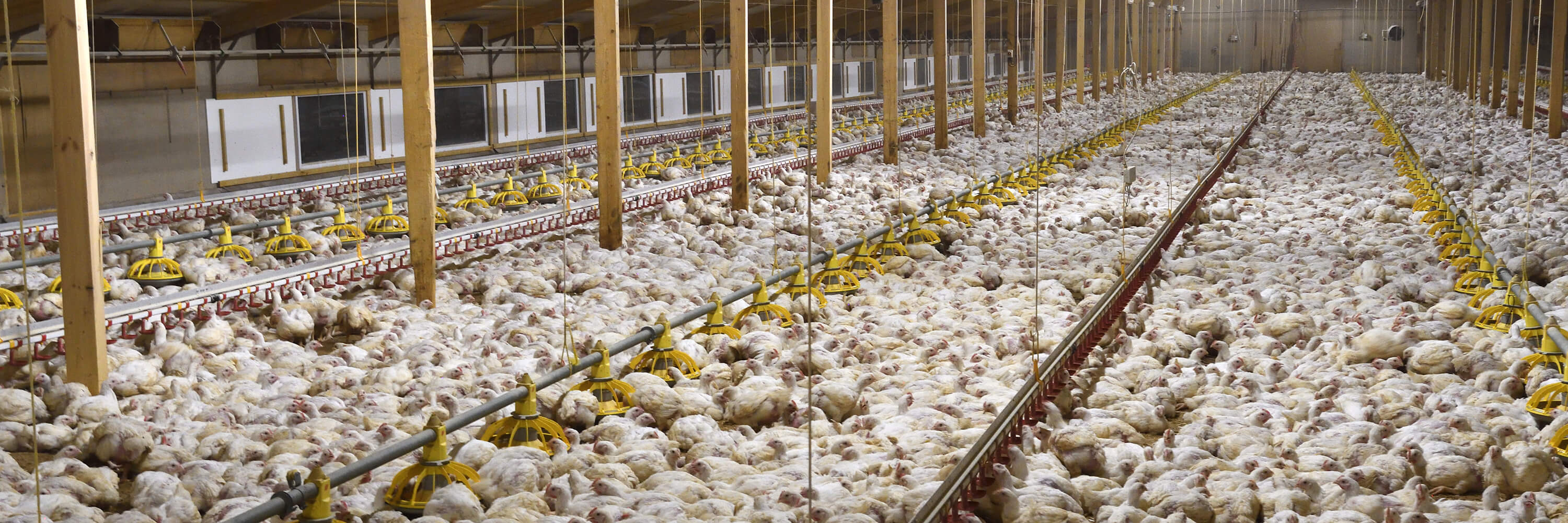
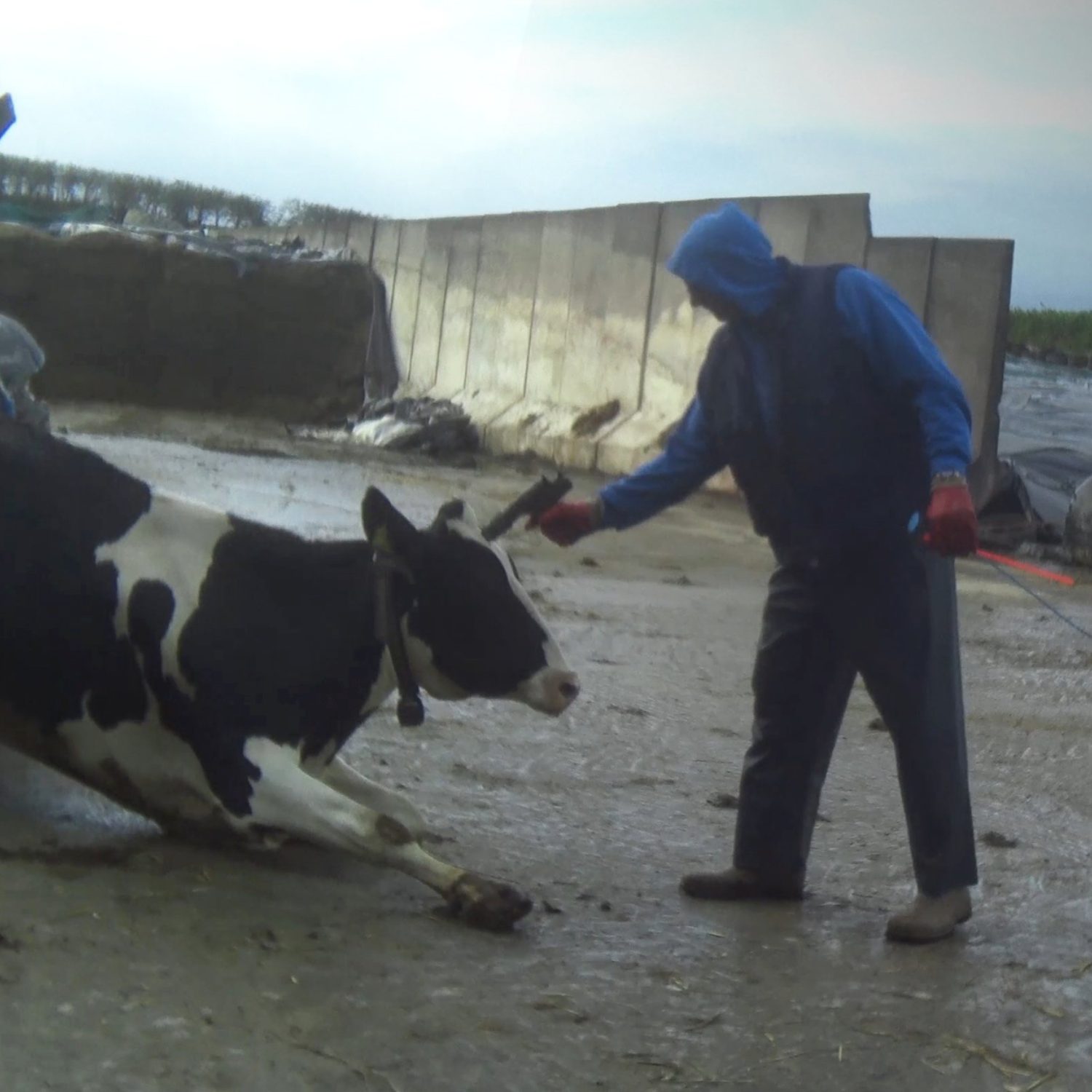
Factory Farming’s Playbook: How the Industry Tries to Get Away With Animal Abuse

In February 2022, Animal Equality released an investigation inside a Welsh dairy farm exposing extreme violence and neglect.
Because of the shocking findings, the footage was aired on a BBC One Panorama 30-minute long documentary about the dairy industry, reaching millions of people and generating huge concern among the public.
The reaction – especially on Twitter and other social media platforms – was so big and loud that our images reached people all over the world, from Europe to Aotearoa New Zealand to the US.
Jan Dutkiewicz, a Policy Fellow at Harvard Law School, was among the people that our investigation reached.
Jan focuses his research on the design, production, circulation, and consumption of everyday commodities, with a primary focus on meat and other food products.
When he came across our footage, he shared on Twitter how he suspected the animal agriculture industry would react, based on what he has been researching over the years.
Jan identified seven steps that he predicted the industry would take in response to our investigation being aired on BBC, based on past examples. Needless to say that his prediction was spot on.
Step 1: Blame Individual Workers
In this Tweet, Jan explains how the first step that the industry often takes following the release of an undercover investigation is to blame the workers captured on camera.
Being the ones actually caught carrying out the violence and abuses, farm workers are the easiest target for the industry to lay the blame on, even though they are in many cases just following orders from those higher up.
By doing this, the industry attempts to shift the focus away from the farm and wider standard farming practices, trying to assure the public that the situation filmed is an ‘isolated case’.
However, the fact that these terrible actions are committed by individuals should not deflect from the real source of the problem: the very nature of the industry itself.
When investigating a chicken farm owned by Moy Park – one of the UK’s largest chicken producers, responsible for the slaughter of over 312 million birds annually – our investigator recorded a manager saying these words:
At the end of the day, it’s about making money. So if I am going to grow a bird for 30 days, feed it, keep it warm, let it drink the water and everything else, and then it is not processed at the factory because it’s not big enough, it’s just rejected, then I’ve just spent £1 feeding it.
Farm Manager at a chicken farm owned by Moy Park
When the industry is driven by money and productivity, how can we expect animal welfare to be considered a priority? Especially where there is no proper, reliable system in place to ensure that the existing laws are adequately monitored or enforced.
Animal Equality has conducted nearly 50 investigations here in the UK, each time uncovering abuse or extreme animal suffering. We report our investigative findings to the relevant authorities and demand that those who commit these crimes are held responsible for their actions. As a result of our investigations, six farm workers have now been convicted of cruelty to animals.
And although holding perpetrators accountable is crucial, it is not enough when their actions are the result of an abusive industry that exploits both workers and animals. There is an urgent need to increase corporate accountability to ensure that the real culprit is identified in the eyes of the law and the public.
Step 2: Blame the Individual Farm
What comes next is an extension of the first step. If before it was just a ‘bad farmer’, at this stage it becomes a ‘bad farm’ among other farms.
The industry in this case tries to reassure the public that what they have seen is not standard practice in the industry, but rather the result of bad management.
However, in the case of Animal Equality’s recent dairy farm investigation, consumers were particularly outraged to learn of the routine separation of cows and calves – a standard, necessary practice on any operating dairy farm.
Animal Equality has been investigating farms and slaughterhouses around the world for over 15 years. We have investigated more than 800 facilities worldwide, and in each and every one we found violence, abuse and/or appalling living conditions.
No matter how much the animal agriculture industry tries to mislead consumers, what the hours and hours of footage we have collected over the years show is undeniable: it is never just one bad farm or bad worker, but rather a rotten system that allows laws to be systematically broken and animals to be horribly abused.
Unfortunately, most of what we see here is typical of the industry as a whole. These are not isolated incidents.
Dr Alice Brough, Swine Veterinarian, referring to Animal Equality’s investigation into P&G Sleigh Pig Unit where we filmed piglets being hammered to death and sows with severe untreated vulva infections.
Step 3: Call It An Isolated Incident
The next step the industry takes is to try to reassure the public about its compliance with animal welfare regulations by leveraging on third-party certifications, like Red Tractor.
By doing this, they focus on the fact that to be certified by these bodies they have to meet the welfare criteria set by them – which are often only marginally above legal minimums – and therefore they want people to think that what has been reported in the investigation cannot be anything other than an isolated incident.
What Jan has identified in these steps is a pattern: relying on accreditation schemes is something the industry almost always does in response to reports of animal abuse.
I’ve been inspected by the bodies and I’ve been given the all-clear from all the relevant bodies and they found nothing wrong.
Owner of Hall Farm, a Red Tractor certified pig farm investigated by Animal Equality in 2017, where we found pigs being confined in sow stalls – metal cages that severely restrict the movement of pregnant pigs and which have been banned in the UK since 1999.
What does this tell us about these accreditation bodies?
Animal Equality has investigated 26 farms accredited by Red Tractor – the biggest accreditation scheme in the UK – including the dairy farm we recently investigated. We have also investigated farms accredited by Quality Meat Scotland and the Soil Association.
Inside Red Tractor-certified farm our investigators have consistently found violations of animal welfare laws and animals suffering in unnatural conditions.
In addition, these bodies – like in the case of Red Tractor – are often owned by the industry itself, which defines the standard to abide by, creating an undeniable conflict of interest.
Step 4: Shoot The Messenger
At this point, the industry points the finger at the activists or organisations who released the footage and reported the abuse.
This happens in various ways, but mainly by saying something along the lines that these are ‘vegan activists with an agenda’.
But, ultimately, this is a desperate move from an industry that has been caught on camera: our footage speaks for itself. As a result of our ability to collect genuine footage and demonstrate what is truly taking place on the ground in farms and slaughterhouses, our work has been published in important outlets like The Times, The Independent, The Guardian, or the BBC.
Often, the industry will also attempt to downplay the severity of the animals’ suffering.
For example, in 2017 Animal Equality investigated Cross Farm in Devon and found pigs living in leaking, dilapidated buildings covered in slurry and forced to lie in their own waste.
After our footage was released, a manager – in an attempt to diminish our reputation – told The Times: “We have no problem. We are a large commercial pig farm and [Animal Equality] is against commercial piggeries, so we expect this sort of trouble from time to time.”
Animal Equality exists to protect farmed animals in a world where it is considered ‘normal’ to exploit them and where they are considered objects, whose only purpose is to provide humans with their milk or flesh. Our objective is always the same: to witness the realities and tell the truth to consumers.
However much the industry wants to deceive the public, what matters is what the footage shows. Who witnessed the suffering and filmed the scenes is largely irrelevant: the abuse happened and there is no denying what was captured on camera.
Step 5: Mea Culpa
Once denying or minimising the seriousness of what was reported is no longer sustainable, the industry may look to publicly apologise, acknowledge the wrongdoing, claim to conduct internal investigations and reassure consumers that something like this will not happen again in future.
According to Jan’s analysis, this is likely a subtle message to the Government to stop looking into the issues. The aim is to avoid further, stronger regulations being put in place.
The current system in fact makes it easy for farms and slaughterhouses to break existing laws, and our investigations are proof of that.
The government body in charge of inspecting farms is the Animal and Plant Health Agency (APHA). However, according to a report, between 2010-2016, on average the APHA inspected 0.49% of eligible farms. To put it differently, this data suggests that each farm is inspected on average every 200 years. Additionally, of the farms inspected, 63.6% (data from 2007 – 2013) were found to be non-compliant with the Code of Practice.
What this shows is that currently we rely heavily on organisations like Animal Equality to bring to light abuses and legal violations inside farms and slaughterhouses. Clearly, this is unacceptable and unsustainable – the Government must take ownership. This is why Animal Equality is demanding the implementation of a licensing system for farms, which would require all farms to pay to register officially and to be inspected every 1-3 years. You can learn more about our request and sign the petition at the link below.
Step 6: Lean Into Transparency
After making big promises to the public that the industry will take action, a further pattern emerges: many involved in the industry will then start publishing content on their website and social media, creating press releases announcing how much they care for the animals they farm.
Some will go as far as to organise tours of their farms. Of course though, this will be prepared for well in advance and visitors will be carefully managed to see only what the farms would wish for them to.
With this tactic, they are implying to the public that there is no better and more reliable source of information. However, Animal Equality has investigated not only intensive factory farms but also ‘high-welfare’ and ‘organic’ farms and found abuses in each of them.
Misleading advertisement is a key strategy of the animal agriculture industry and it is alarming that there is currently little regulation to prevent it.
Think of the images they like to portray on packages or the adjectives they use in their language – like ‘humane’ – or the adverts of ‘happy cows’ grazing in a pasture, or ‘happy chickens’ roaming freely.
We compared those advertisements and packaging with our footage, and the gap could not be bigger.
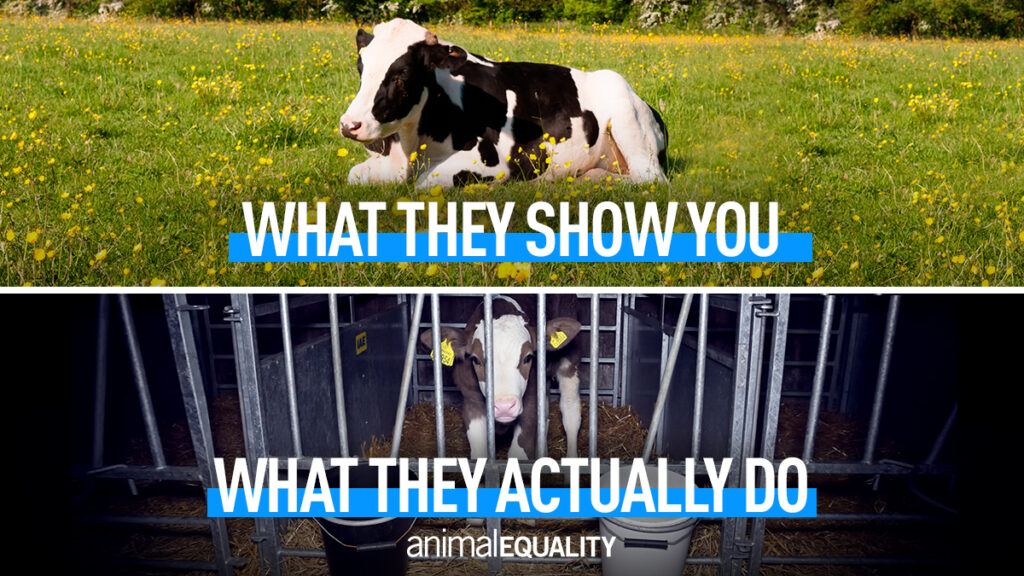
Step 7: Prevent Further Investigations
In some countries, the industry even goes so far as to urge governments to criminalise investigations by demanding laws to prohibit the filming and circulation of what happens inside farms.
Laws like this currently exist in the US and are known as ‘ag-gag’ laws.
If laws like these were to be implemented more broadly, animals would be in even greater danger than they currently are. Farmed animals would be entirely at the mercy of an industry that exploits them for profit and personal gain.
In the eyes of industry, the lives of farmed animals are only as valuable as the market price of their body parts. Animals exist, in their view, to be exploited for their meat and milk. They are kept in the dark, in sheds or cages so small that they cannot move or turn around, let alone express their natural behaviours.
Investigations are currently the only way to uncover the abuses these animals are forced to endure throughout their lives. We tell their stories to the world, in turn creating long-lasting change and moving towards a kinder, more compassionate world where animals no longer have to suffer for human consumption.
Jan’s predictions are the result of years of research and studies about the issue and are true for the industry worldwide.
NowThis Media interviewed Jan about his predictions and academic insights. You can watch the full video below:
Animal Equality is currently campaigning for increased inspections to be carried out on farms and for a more robust framework to be implemented, to better protect those trapped in the current system. We are calling for a licensing system to be put in place.
You can read more about our request and add your name to the accompanying petition below.
We have collected over 60,000 signatures so far. Help us reach 100,000!
About Jan
Jan is a Policy Fellow at Harvard Law School. His research examines the design, production, circulation, and consumption of everyday commodities, with a primary focus on meat and other food products. This work connects political science, environmental studies, design and science and technology studies, and anthropological approaches to the study of value.
He has been published in the academic and popular press on topics related to agriculture and food politics, corporate social responsibility, biodiversity and environmental politics, as well as the theory and practice of animal ethics.
More information about Jan and his work can be found here.
Recommended
